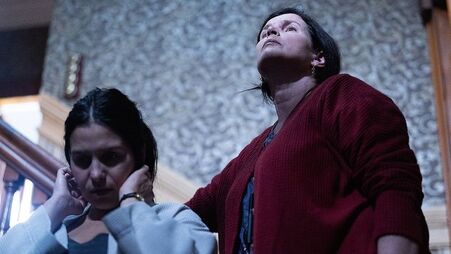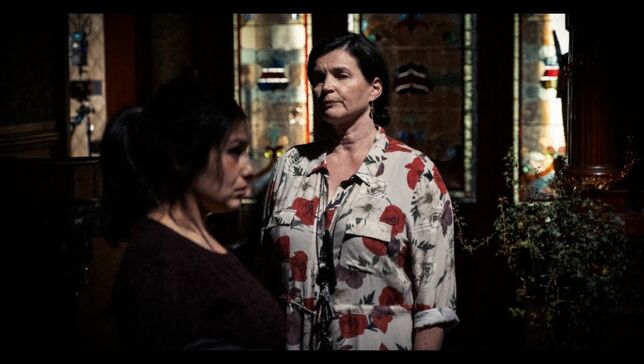 What is film, but a memory captured as moving pictures?... …My very first memory comes from when I was just two. Two year olds are callous, stupid creatures. I happened to be one that also wanted to be a cowboy, so I climbed up on my dog to “go for a ride,” ending up falling forehead first into the corner of a speaker and finding out your body is really just a stiff balloon full of blood. What a way to enter this world, am I right? While I’ll never forget the terror of my dad applying wash cloth after wash cloth drenched in blood, the memory itself is fuzzy. Choppy. Pieces missing. Kind of like an old VHS tape. The older the memory gets, the more the “tape” skips, leaving my adult self to fill in the blanks. It’s this idea of memory as a film in our minds that writer/director Jake Mahaffy’s film Reunion lives in. The film, which had its World Premiere at Nightstream, follows Ellie (Emma Draper), a pregnant woman who returns home, where she is reacquainted with her estranged mother, Ivy (Julia Ormond) and incapacitated father, Jack (John Bach). In the midst of working on an academic book and worrying over being a mother, Ellie finds herself haunted by sins of the past, uncovering dark truths that threaten to tear her already hanging by a thread family apart. When Ellie first arrives at her childhood home, a sprawling mansion surrounded by lush greenery, it’s clear that she doesn’t want her mother to be there, with a hint of anger at her presence under the surface. “I’m fine. The baby’s fine”, Ellie tells Ivy. But she’s not fine. Not at all. Mostly thanks to Ivy. We’ve all known someone with parents who tear their kids down, or experienced it ourselves, and it’s obvious from the get go that Ellie has experienced a lifetime of emotional abuse at the lips of Ivy. At each opportunity, Ivy wants Ellie to act “normal.” And there’s no apology for that behavior either, with Ivy referring to the trauma their family has faced as, “what’s done is done.” What’s done is not done though. Far from it. We soon learn that Ellie had a sister, Cara (Ava Keane). The full story behind Cara is vague, leaving the viewer to interpret through flashbacks which play like old movie reels, including some seedy “doctor” play with Jack, but what is clear is that Ellie still feels a great deal of guilt towards her sister, haunted by her presence everywhere she goes in the house. Except Ellie isn’t afraid of Cara. Instead, she seems to be used to the face of her sister following her, begging Cara to leave her baby alone, as if to say she can torment Ellie again once the baby is safely born. As someone who has lost family, I can tell you the dead lie in everything, if you let them. And Ellie is utterly incapable of avoiding the memory of Cara. Whatever secret Ellie and Cara have (I won't spoil it here), the house seems intent on reminding her as well. The cinematography by Adam Luxton paints the luxurious house as drab and old. Even on the sunniest of days, this house of sadness is filled with darkness. There’s very little “light” in Reunion, fitting to the film’s dark themes and Ellie’s troubled mind. Worse for Ellie, the entire house is adorned in wallpaper sporting all sorts of green vegetation, as if to constantly remind Ellie that Ivy is everywhere in these walls as well. It’s no wonder that Ellie has developed the motto, “I experience a deep sense of peace in all situations.” It’s a theme which carries through the film. No matter how dark, depressing or deadly the film gets, editor Jonathan Woodford-Robinson eases the tension with hypnotic images that appear to be from inside Ellie’s womb. For as dark as Reunion is, it’s a wonderfully beautiful expression of grief. Despite ghosts of the past and near unbearable tension between Ellie and Ivy, Reunion is not at all a film that relies on scares. Instead, Reunion treads water, drifting slowly towards its conclusion. Mahaffy’s film is one that burrows deep into the mind and rests there, focused more on acquainting us with the tragedy of this family rather than the horror that still festers around them. That isn’t to say Reunion doesn’t have its moments—I’m looking at you nightmarish dream fetus—but this is much more an exploration of an already disintegrated family and discovering what got them there. Like the broken vase which the story revolves around, Ellie’s family is just barely held together by the glue of their untrustworthy memories together. “Do you remember the good times,” asks Ivy. Ellie has no response, which says everything. Reunion is not a “good” time. It is a bleak, somber film. The character relationships outside of Ellie and Ivy are never fully developed—I haven’t even mentioned home repairman Gus (Cohen Holloway), and for good reason—but these things don’t need to explained. Reunion lets us fill in the gaps with our own dark fantasies, which is where the true horror of the film lies. More than ever, families are finding themselves torn apart by opposing belief systems and the realization that someone you thought you knew growing up, may not actually be that person. The person that lives in our memory and the one who lives in reality are two different people. For many viewers, Reunion is going to strike a deeply personal chord that resonates long after the credits roll. It’s a depressing experience. But it’s also an expertly crafted film anchored by a heartbreaking performance from Ormond and her tortured character. This is one film memory that will be playing in my mind for weeks to come. By Matt Konopka
0 Comments
Leave a Reply. |
Archives
March 2023
|


 RSS Feed
RSS Feed